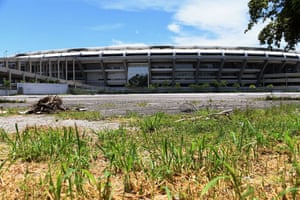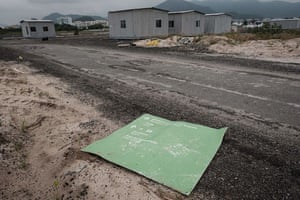Brazil's Summer Games Legacy
"It's totally deserted. I had to bring my son over to the plants to go to the bathroom."
"The government didn't have money to throw a party like that, and we're the ones who have to sacrifice."
Vera Hickmann, 42, resident of Deodoro, Rio de Janeiro
"The nation is in crisis, Rio de Janeiro is in crisis -- it's time to be cautious [and not rush into turning Olympics facilities into public sporting areas and schools]."
Marcelo Crivella, mayor, Rio de Janeiro
"The government, business people -- they tricked us."
"They came, they robbed, and they said goodbye. Now they're gone, and where are our upgrades?"
Camila Felix Muguet, 36, Deodoro, Rio de Janeiro
"The government put sugar in our mouths and took it out before we could swallow. They turned their backs on us."
"The Olympics ended, Deodoro ended. We're going to be forgotten."
Luciana Oliveira Pimentel, social worker, Deodoro

The Olympics already seem like a distant memory when you look at Rio de Janeiro's current state of financial troubles. Credit:
Ricardo Moraes/Reuters
That was on borrowed money and now it's dissipated, gone. The country is now in a state of economic austerity. Brazil wanted to have a party, to show its first-world status, and to entertain the world, inviting it to come along and admire what has been accomplished. There were doubts about the sanitation and safety of competitors using Brazil's famed waters and beaches through water-borne diseases as a result of the massive pollution in a world capital that had long neglected the need to have a robust national sewage treatment strategy.
The investment that should have been poured into vital infrastructure upgrades and management to improve the lives of Brazilians was instead sidelined as Brazil postured and preened, using the financing it could muster to prepare for the presentation of its winning Summer Olympics bid. The frantic building of the required stadiums and other Olympic facilities for proud Olympics presentation.
 |
| A view from outside Maracana Stadium, which has been looted and damaged since the Rio 2016 Games. Photograph: Vanderlei Almeida/AFP/Getty Images |
A large part of the Olympics venues were built in one of the city's most poverty-stricken areas, where electricity and potable water infrastructure, communication and transportation were all invested in for the Games. The Olympic buildings, the protesting residents of Deodoro were assured, would be their gift from the government, maintained and serviced for the community to use and enjoy.
Those buildings and stadiums are shuttered, and already becoming dilapidated. Conversion of the canoe slalom course into a huge public swimming pool was promised but was shuttered. Some of the facilities were to have been converted into badly needed, modern schools. Independent economists are known to argue that bids for the Olympics are done under false premises leading to public money wasted. Rio joins a long list of cities burdened by the white elephants of the Olympics.
 |
| Abandoned prefabricated houses remain next to the Olympic golf course in Rio. Photograph: Yasuyoshi Chiba/AFP/Getty Images |
"We've made an early legacy here. I think this is something unheard of in the history of the Olympics", said then-mayor of the city when the giant swimming pool opened before the Games for public use. That pool is no longer open. A new rapid bus line expanded before the Olympics where homes, the community's plaza, and main park area were confiscated for the construction, is not accessible to residents; the promised bus terminal was never built.
Labels: Brazil, Controversy, Crisis Management, Economics, Olympic Games
0 Comments:
Post a Comment
<< Home